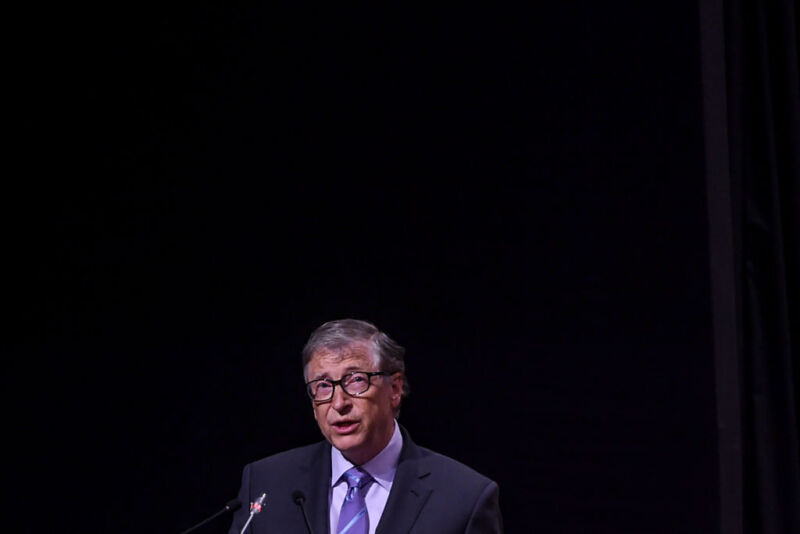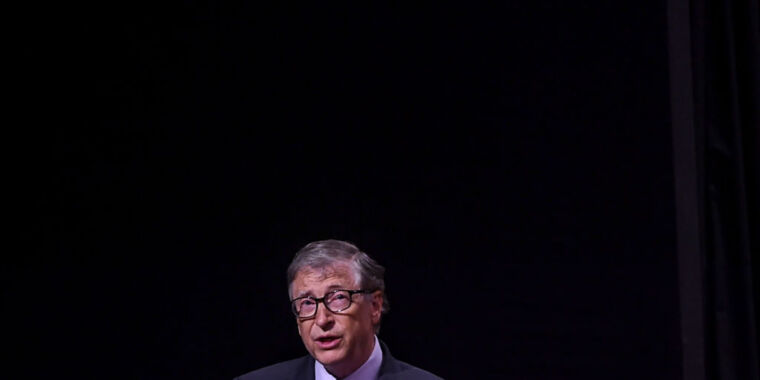
Throughout the pandemic, the world’s richest men added about a trillion dollars to their net worth. The Washington Post reported that SpaceX’s Elon Musk and Amazon’s Jeff Bezos pocketed a fifth of that. But while some billionaires spent the pandemic getting richer, Microsoft co-founder Bill Gates looked at the world crumbling around him and decided to make a different business plan.
“I will move down and eventually off of the list of the world’s richest people,” Gates declared in a blog, announcing his plan to personally donate funds that will dramatically increase the annual amount that the Bill & Melinda Gates Foundation pays out to support global initiatives in the name of progress.
To address global crises that Gates says have been profoundly exacerbated by the pandemic, “the Gates Foundation intends to increase spending from nearly $6 billion per year before COVID to $9 billion per year by 2026.” The proposed 50 percent annual budget increase has already been unanimously agreed upon “in principle” by the foundation’s formal board members.
Gates said as one of the world’s richest men, it’s his humanitarian duty to give more.
“The great crises of our time require all of us to do more,” Gates said in a foundation press release announcing his decision. “This is why I am raising my giving to the Gates Foundation, helping to increase payout to $9 billion every year. I hope by giving more, we can mitigate some of the suffering people are facing right now and help fulfill the foundation’s vision to give every person the chance to live a healthy and productive life.”
Gates’ net worth is currently estimated at $102.7 billion. He said he would be immediately transferring $20 billion to the Gates Foundation this month, expecting that the money will be used to “increase its investments in its existing strategies, which include global health and development, gender equality, and education, primarily in low- and middle-income countries, in addition to its work in US education and economic mobility.” Combined with a $3.1 billion gift from billionaire Warren Buffett, that brings the Gates Foundation’s current endowment to “approximately $70 billion.”
For perspective, that means the Gates Foundation’s current endowment nearly equals the same amount of money that the foundation has spent since its founding in 2000 ($79.2 billion).
That seems encouraging, but Gates predicts that the need for funding will only increase over time. That’s why, when he looks to the future, the world’s currently No. 5 richest man says he plans to act even more drastically than giving away approximately a fifth of his net worth. To make a lasting impact, he vowed “to give all my wealth to the foundation other than what I spend on myself and my family.”
Throwing money at these problems
Since the pandemic started, the Gates Foundation has struggled to fund key COVID response efforts “without taking money away from other important work that we fund.”
Gates watched as the foundation acted immediately over the past two years to fund COVID responses by committing “$2.1 billion to gender equality, nearly $1 billion to advance global nutrition, and over $2 billion to address the COVID-19 pandemic.” As funds got stretched, he fretted over diverted funding from research and programs addressing longstanding issues, like combating “the damage from climate change,” which “is already worse than most models predicted.”
But at a time when pessimism is on the rise, Gates says his philanthropy helps him to “believe progress is possible.”
The foundation’s increased annual budget will focus on funding research and development of new programs and technologies in five key areas: pandemic prevention, global health, climate mitigation (and adaption), education improvement, and food costs.
However, even the optimistic billionaire concedes that no matter how much money he throws at these problems, it could still amount to too little too late. “These innovations will not come in time to avoid the problems altogether, but the faster we move, the less people will suffer,” Gates said.
In addition to all the money that Gates plans to donate to the foundation in the coming years, he says he will also continue “giving and investing in US health care issues” and additional climate change solutions (through Gates’ coalition of private investors, Breakthrough Energy). He says that these efforts will likely generate perpetual wealth. That may keep Gates from actually ever really giving away all his money, but he clarified that all proceeds from his ongoing investments would be funneled back to the foundation.
In the US, it looks like philanthropists like Gates will lead the charge against climate change, considering that senator Joe Manchin III (D-W. Va.) recently opposed any new spending on climate change that’s being discussed as part of an “economic package” currently being debated. Manchin also said he opposes plans in the economic package to increase taxes on the rich. Divisive politics like this example have become increasingly responsible for holding back progress, Gates said.
Gates called it a privilege to invest his personal wealth to help tackle the world’s biggest challenges. In his blog, he seemed to suggest that his plan to remove himself from the list of the world’s richest men—for the first time since the ’80s—would be a worthy goal for any billionaire currently enjoying those tax breaks that Manchin so staunchly defends. “I hope others in positions of great wealth and privilege will step up in this moment, too,” Gates said.








